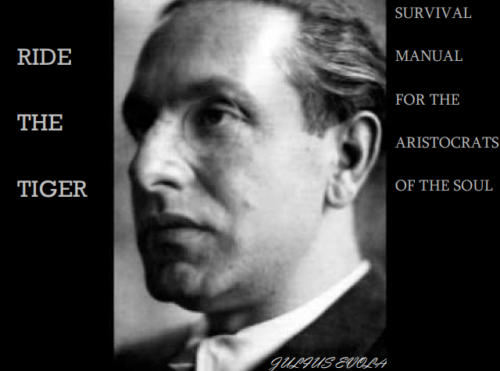
This reading continues on from here.
The sixth essay in Ride The Tiger is called “Active Nihilism – Nietzsche”, and continues to deal with the problem of the Death of God. Also continuing with the esoteric theme of this book, Evola appears to insist that the solution is alchemical. The negative is overwhelming and ascendant; it cannot be resisted. So the question becomes “how far the negative can be transformed into something positive.”
Here we are concerned with “the transition to the postnihilist stage.” Modern man is free, free from the strictures of Abrahamism – but free for what? We have striven against our enslavement for so long that we don’t know what to do with freedom. We invented God to assuage our existential anxiety, and, now that we are “free” from this God, that anxiety has rushed back with a vengeance. Evola cites Sartre here: “We are condemned to be free.”
Evola contends that Nietzsche’s conception of the Superman is not sufficient to avoid this nihilism. His reasoning is that the Superman theory is not sufficiently different from the other eschatologies, such as the Marxist one, and therefore cannot be more than a pseudosolution to the problem of nihilism.
As was true for Marxism, the Superman theory could potentially be used to justify all manner of horrors in the present by promising paradise in the future. However, Nietzsche’s theory of eternal recurrence strikes much closer to what might be described as a perennial philosophy.
The seventh essay is called “Being Oneself.” It seems as if that, once the pseudosolutions and outright false philosophies are abandoned, what one is left with is oneself. This something is beyond morality (indeed, morality is considered something to be liberated from), and internal, instead of imposed from without as if by God or King.
Nietzsche comes in for some criticism here. Evola considers his attitude to the human spirit “materialistic”, but concedes that Nietzsche must have seen beyond because he is capable of distinguishing the “Self” from the “I”. Other thinkers, such as Guyau, are considered, but dismissed for not offering anything truly new, merely “restrictions that more or less return to one οf the systems οf the old morality.”
Evola concludes that the answer, as ever, is to “Know Thyself”. However, there’s a caveat. In the past, it was easier to know thyself because one was defined by strictures of class, religion, nation, caste and many other things. Modern man is free, so he cannot fall back on these now-abandoned strictures.
Modern man is, in fact, so free that it is as if he has been shattered to pieces. His soul “contains multitudes”. This shattering, Evola contends, can be most easily observed in remorse, which is an emotion that mostly affects divided people and which is characteristic of our time.
The eighth essay is called “The Transcendent Dimension – ‘Life’ and ‘More Than Life'”. The man who gets it, Evola contends, is one who possesses a transcendental dimension, a spiritual dimension. Here he distances himself further from Nietzsche, who for Evola was more of a vessel that history acted through than a genuine actor in his own right. Nietzsche’s great error was “confusion of the sacred with the profane”.
Evola, through quoting Nietzsche, gives us a prescription for a man of gold, although without using alchemical terms: a many who has great passions (clay), but who holds them in check (iron), and who hold them in check with apparent ease (silver) and who, last of all, does not draw any particular egoic satisfaction from doing so (gold). Here, the highest sort of man is one who overcomes great dangers, for it is only in doing so that all these qualities can be expressed.
Evola mentions the common interest in Zen philosophy among the Beat Generation that was heavily influenced by the existentialists. Here, religious belief (of any kind) is rejected as a failure of the human spirit, of the sort of person who did not have the character to survive the tension of the Age of Nihilism, and who hence surrendered to easy answers.
*
If you enjoyed reading this essay, you can get a compilation of the Best VJMP Essays and Articles of 2017 from Amazon for Kindle or Amazon for CreateSpace (for international readers), or TradeMe (for Kiwis).

